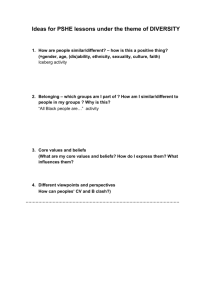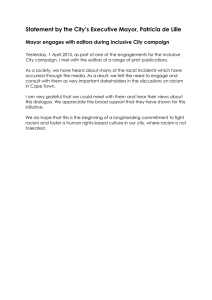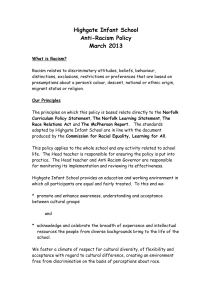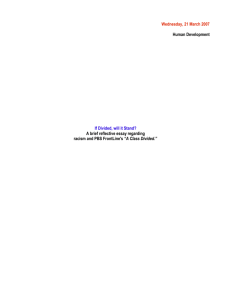Document 13523983
advertisement
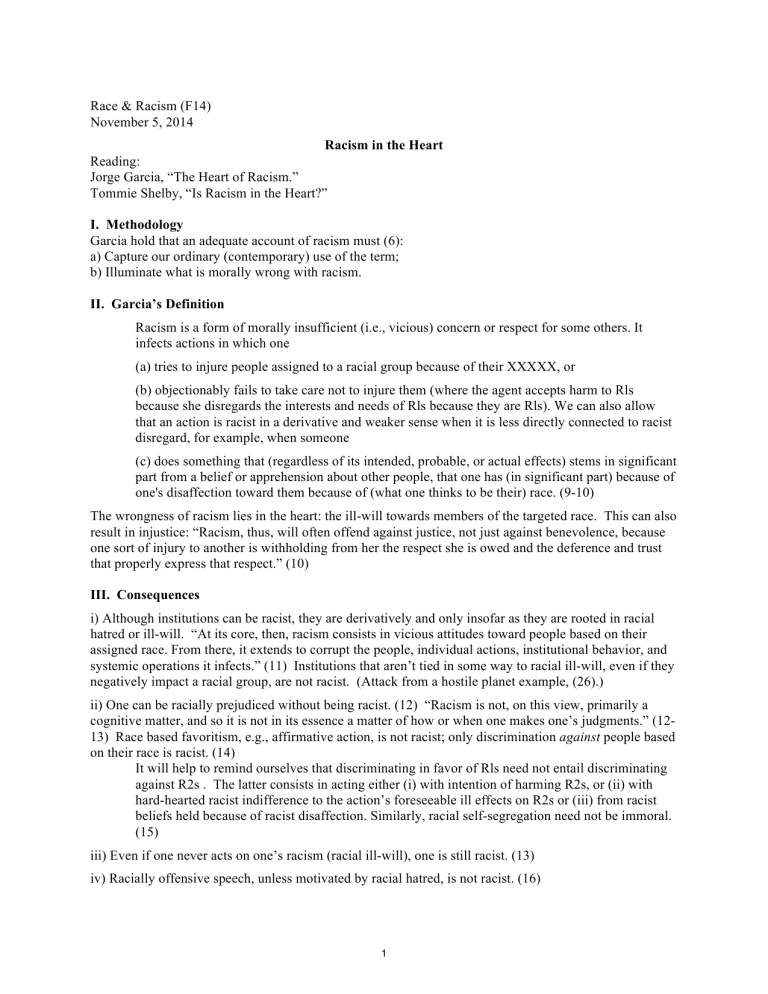
Race & Racism (F14) November 5, 2014 Racism in the Heart Reading: Jorge Garcia, “The Heart of Racism.” Tommie Shelby, “Is Racism in the Heart?” I. Methodology Garcia hold that an adequate account of racism must (6): a) Capture our ordinary (contemporary) use of the term; b) Illuminate what is morally wrong with racism. II. Garcia’s Definition Racism is a form of morally insufficient (i.e., vicious) concern or respect for some others. It infects actions in which one (a) tries to injure people assigned to a racial group because of their XXXXX, or (b) objectionably fails to take care not to injure them (where the agent accepts harm to Rls because she disregards the interests and needs of Rls because they are Rls). We can also allow that an action is racist in a derivative and weaker sense when it is less directly connected to racist disregard, for example, when someone (c) does something that (regardless of its intended, probable, or actual effects) stems in significant part from a belief or apprehension about other people, that one has (in significant part) because of one's disaffection toward them because of (what one thinks to be their) race. (9-10) The wrongness of racism lies in the heart: the ill-will towards members of the targeted race. This can also result in injustice: “Racism, thus, will often offend against justice, not just against benevolence, because one sort of injury to another is withholding from her the respect she is owed and the deference and trust that properly express that respect.” (10) III. Consequences i) Although institutions can be racist, they are derivatively and only insofar as they are rooted in racial hatred or ill-will. “At its core, then, racism consists in vicious attitudes toward people based on their assigned race. From there, it extends to corrupt the people, individual actions, institutional behavior, and systemic operations it infects.” (11) Institutions that aren’t tied in some way to racial ill-will, even if they negatively impact a racial group, are not racist. (Attack from a hostile planet example, (26).) ii) One can be racially prejudiced without being racist. (12) “Racism is not, on this view, primarily a cognitive matter, and so it is not in its essence a matter of how or when one makes one’s judgments.” (1213) Race based favoritism, e.g., affirmative action, is not racist; only discrimination against people based on their race is racist. (14) It will help to remind ourselves that discriminating in favor of Rls need not entail discriminating against R2s . The latter consists in acting either (i) with intention of harming R2s, or (ii) with hard-hearted racist indifference to the action’s foreseeable ill effects on R2s or (iii) from racist beliefs held because of racist disaffection. Similarly, racial self-segregation need not be immoral. (15) iii) Even if one never acts on one’s racism (racial ill-will), one is still racist. (13) iv) Racially offensive speech, unless motivated by racial hatred, is not racist. (16) 1 IV. Issues i) What about Kiplingesque racism, i.e., for the good of the “inferior” racial group? Reply: There is racial disregard in holding them inferior. It is abusive paternalism. (18) ii) What about racial preference, e.g., in distributing goods? Reply: Doing favors for someone based on race is not the same as acting against the other. Racism requires acting against members of the targeted race. Extra good-will towards members of one’s own race is not necessarily ill-will towards the other. (20) iii) What about well-meaning individuals acting collaborating with racist institutions? Reply: I suggest that in addition to the two forms of racist disaffection we have already identified-the core concept of racial malevolence and the derivative concept of a race-based insufficiency of good-will-we can allow that an action may be called racist in an extended sense of the term when it is poisoned by racism, even where the racial disaffection that corrupts it does not lie in the agent's own heart but in those to whom the agent accedes. (22) Such actions may be racist in a derivative sense, and not as morally blameworthy. iv) How is racism tied to racist ideology? Reply: In any case, someone with such [ideological] beliefs is likely to have racist desires and volitions whether they cause, or are caused by, the beliefs. It is important to observe, pace Skillen, first, that racism need entail no ’system’ of beliefs and, second, while various institutions and other elements of the cultural environment may nurture racism and derived racist beliefs, racism nevertheless lies fundamentally in individuals. (32) v) Can’t there be racist institutions without racist individuals? Reply: Institutional racism appears to be capable of continuing after individual racism has largely died out. Think of a case where, for example, officials continue, uncomprehendingly, to implement policies originally designed, and still functioning, to disadvantage those assigned to a certain racial group. Indeed, I strongly doubt that the qualifier ’and still functioning’ is necessary. Institutional racism can exist without actually functioning to harm anyone. (33) V. Shelby’s view a) Shelby objects to Garcia’s methodological assumptions. i) “Thick concept” approach – is the concept of ‘racism’ used consistently? ii) “Stipulative” approach – might there be multiple stipulations that should be considered? b) Racist beliefs are necessary (ill will isn’t sufficient): i) Peter and Andre example (414) ii) What is it to hate someone just because they are black? c) Positive view: racism is an ideology that legitimizes the subordination and exploitation of a race. (415416) Garcia, J. L. A. “The Heart of Racism.” Chapter 10 in Race and Racism. Edited by Bernard Boxill. Oxford University Press, 2001. © Oxford University Press. All rights reserved. This content is excluded from our Creative Commons license. For more information, see http://ocw.mit.edu/help/faq-fair-use/. Shelby, Tommie. “Is Racism in the Heart?” Journal of Social Philosophy 33, no. 3 (2002): 411-20. © John Wiley & Sons. All rights reserved. This content is excluded from our Creative Commons license. For more information, see http://ocw.mit.edu/help/faq-fair-use/. 2 MIT OpenCourseWare http://ocw.mit.edu 24.236 / 24.636 Topics in Social Theory and Practice: Race and Racism Fall 2014 For information about citing these materials or our Terms of Use, visit: http://ocw.mit.edu/terms.
